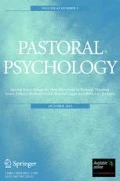Abstract
A sample of 311 primary school teachers completed the Spiritual Health in Four Domains Index alongside the abbreviated revised Eysenck Personality Questionnaire and measures of religiosity. The data demonstrate that higher levels of spiritual health are found among older teachers who record low scores on the psychoticism scale and who practice religious faith through church attendance and personal prayer.
Similar content being viewed by others
References
Beit-Hallahmi, B. & Argyle, M. (1997). The psychology of religious belief and experience. London: Routledge.
Ellison, C. (1983). Spiritual well-being: Conceptualization and measurement. Journal of Psychology and Theology, 11, 330-340.
Eysenck, H.J. & Eysenck, M.W. (1985). Personality and individual differences: A natural science approach. New York: Plenum Press.
Eysenck, H.J. & Eysenck, S.B.G. (1976). Psychoticism as a dimension of personality. London: Hodder and Stoughton.
Eysenck, M.W. (1998). Personality and the psychology of religion. Mental Health, Religion and Culture, 1, 11-19.
Fehring, R., Miller, J. & Shaw, C. (1997). Spiritual well-being, religiosity, hope, depression, and other mood states in elderly people coping with cancer. Oncology Nursing Forum, 24, 663-671.
Fisher, J.W. (1998). Spiritual health: Its nature, and place in the school curriculum. Unpublished PhD dissertation, The University of Melbourne.
Fisher, J.W. (1999). Developing a spiritual health and life-orientation measure for secondary school students. Proceedings of the University of Ballarat annual research conference, 15 October, 57-63.
Fisher, J.W. (2000a). Feeling good, living life: A spiritual health measure for young children. Presented at the First International Conference on Children's Spirituality, University College Chichester, UK, 9–12 July.
Fisher, J.W. (2000b). Comparing levels of spiritual well-being in State, Catholic and Independent schools in Victoria, Australia. Journal of Beliefs and Values (in press).
Fisher, J.W. (2000c). Students career choice and SHALOM. Presented at the International Seminar on Religious Education and Values ISREV XII, Israel, 23–28 July.
Fisher, J.W., Francis, L.J. & Johnson, P. (2000). Assessing spiritual health via four domains of spiritual well-being: the SH4DI. Pastoral Psychology, 49, 133-145.
Francis, L.J. (1986). Partnership in rural education: Church schools and teacher attitudes. London: Collins Liturgical Publications.
Francis, L.J. (1987). Religion in the primary school: Partnership between church and state? London: Collins Liturgical Publications.
Francis, L.J. (1992). Is psychoticism really a dimension of personality fundamental to religiosity? Personality and Individual Differences, 13, 645-652.
Francis, L.J. (1993). The dual nature of the Eysenckian neuroticism scales: A question of sex differences? Personality and Individual Differences, 15, 43-59.
Francis, L.J. (1997). The psychology of gender differences in religion: A review of empirical research. Religion, 27, 81-96.
Francis, L.J., Brown, L.B. & Philipchalk, R. (1992). The development of an abbreviated form of the Revised Eysenck Personality Questionnaire (EPQR-A): its use among students in England, Canada, the USA and Australia. Personality and Individual Differences, 13, 443-449.
Francis, L.J., Lewis, J.M., Brown, L.B., Philipchalk, R. & Lester, D. (1995). Personality and religion among undergraduate students in the United Kingdom, United States, Australia and Canada. Journal of Psychology and Christianity, 14, 250-262.
Francis, L.J., Philipchalk, R. & Brown, L.B. (1991). The comparability of the short form EPQ-R with the EPQ among students in England, the USA, Canada and Australia. Personality and Individual Differences, 12, 1129-1132.
Muldoon, M. & King, N. (1995). Spirituality, health care, and bioethics. Journal of Religion and Health, 34, 329-349.
National Interfaith Coalition on Aging. (1975). Spiritual well-being: A definition. Athens: Georgia, NICA.
Pearson, P.R. & Francis, L.J. (1989). The dual nature of the Eysenckian lie scales: Are religious adolescents more truthful? Personality and Individual Differences, 10, 1041-1048.
Schneiders, S. (1986). Theology and spirituality: Strangers, rivals, or partners? Horizons, 13, 257-264.
Author information
Authors and Affiliations
Rights and permissions
About this article
Cite this article
Fisher, J.W., Francis, L.J. & Johnson, P. The Personal and Social Correlates of Spiritual Well-Being Among Primary School Teachers. Pastoral Psychology 51, 3–11 (2002). https://doi.org/10.1023/A:1019738223072
Issue Date:
DOI: https://doi.org/10.1023/A:1019738223072




